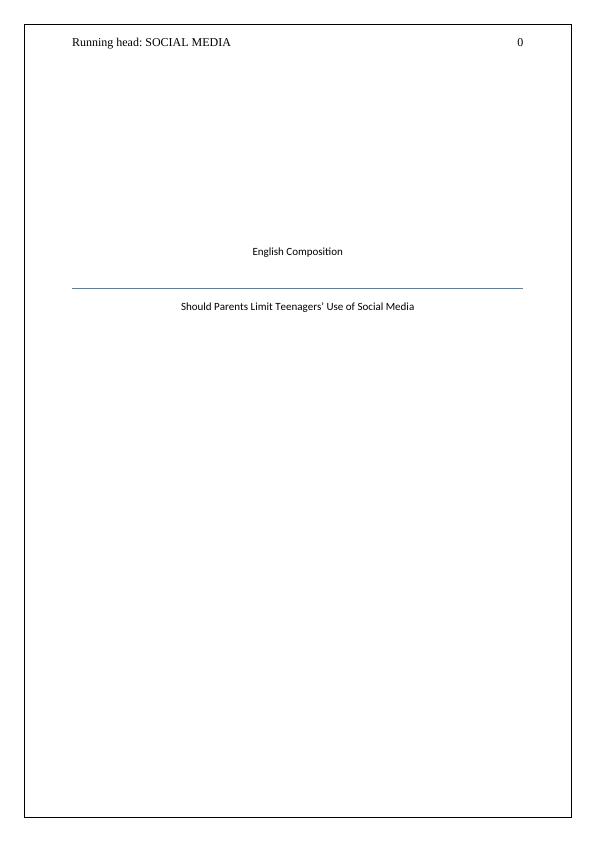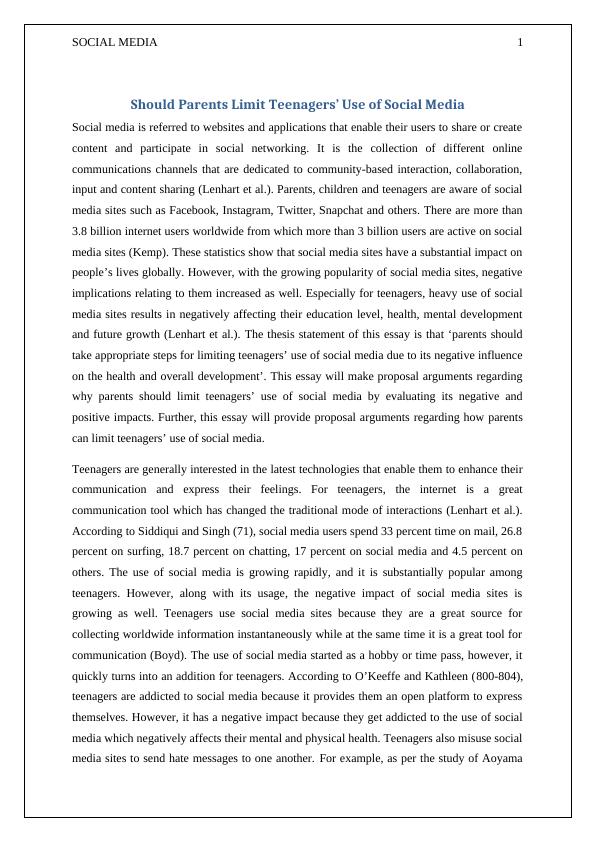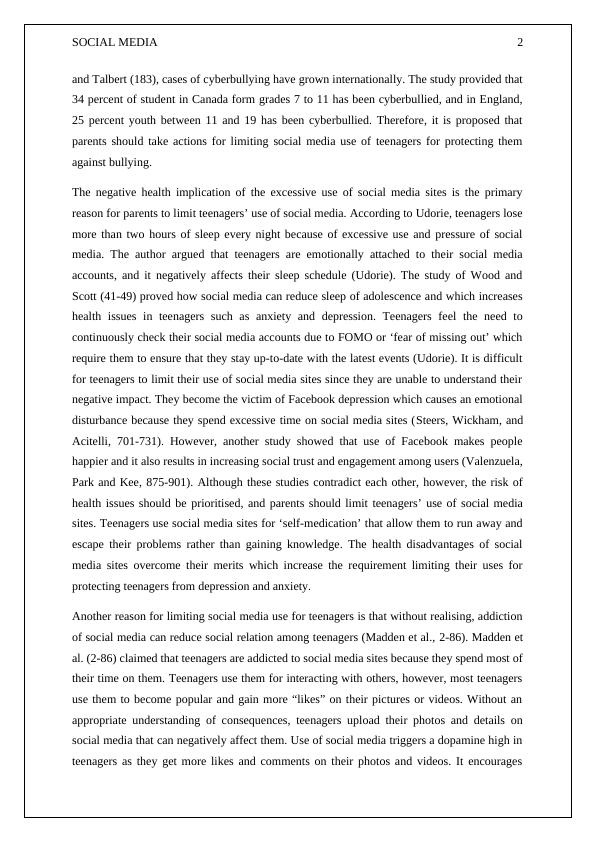Should Parents Limit Teenagers’ Use of Social Media
Added on 2023-06-14
9 Pages2894 Words69 Views
Running head: SOCIAL MEDIA 0
English Composition
Should Parents Limit Teenagers’ Use of Social Media
English Composition
Should Parents Limit Teenagers’ Use of Social Media

SOCIAL MEDIA 1
Should Parents Limit Teenagers’ Use of Social Media
Social media is referred to websites and applications that enable their users to share or create
content and participate in social networking. It is the collection of different online
communications channels that are dedicated to community-based interaction, collaboration,
input and content sharing (Lenhart et al.). Parents, children and teenagers are aware of social
media sites such as Facebook, Instagram, Twitter, Snapchat and others. There are more than
3.8 billion internet users worldwide from which more than 3 billion users are active on social
media sites (Kemp). These statistics show that social media sites have a substantial impact on
people’s lives globally. However, with the growing popularity of social media sites, negative
implications relating to them increased as well. Especially for teenagers, heavy use of social
media sites results in negatively affecting their education level, health, mental development
and future growth (Lenhart et al.). The thesis statement of this essay is that ‘parents should
take appropriate steps for limiting teenagers’ use of social media due to its negative influence
on the health and overall development’. This essay will make proposal arguments regarding
why parents should limit teenagers’ use of social media by evaluating its negative and
positive impacts. Further, this essay will provide proposal arguments regarding how parents
can limit teenagers’ use of social media.
Teenagers are generally interested in the latest technologies that enable them to enhance their
communication and express their feelings. For teenagers, the internet is a great
communication tool which has changed the traditional mode of interactions (Lenhart et al.).
According to Siddiqui and Singh (71), social media users spend 33 percent time on mail, 26.8
percent on surfing, 18.7 percent on chatting, 17 percent on social media and 4.5 percent on
others. The use of social media is growing rapidly, and it is substantially popular among
teenagers. However, along with its usage, the negative impact of social media sites is
growing as well. Teenagers use social media sites because they are a great source for
collecting worldwide information instantaneously while at the same time it is a great tool for
communication (Boyd). The use of social media started as a hobby or time pass, however, it
quickly turns into an addition for teenagers. According to O’Keeffe and Kathleen (800-804),
teenagers are addicted to social media because it provides them an open platform to express
themselves. However, it has a negative impact because they get addicted to the use of social
media which negatively affects their mental and physical health. Teenagers also misuse social
media sites to send hate messages to one another. For example, as per the study of Aoyama
Should Parents Limit Teenagers’ Use of Social Media
Social media is referred to websites and applications that enable their users to share or create
content and participate in social networking. It is the collection of different online
communications channels that are dedicated to community-based interaction, collaboration,
input and content sharing (Lenhart et al.). Parents, children and teenagers are aware of social
media sites such as Facebook, Instagram, Twitter, Snapchat and others. There are more than
3.8 billion internet users worldwide from which more than 3 billion users are active on social
media sites (Kemp). These statistics show that social media sites have a substantial impact on
people’s lives globally. However, with the growing popularity of social media sites, negative
implications relating to them increased as well. Especially for teenagers, heavy use of social
media sites results in negatively affecting their education level, health, mental development
and future growth (Lenhart et al.). The thesis statement of this essay is that ‘parents should
take appropriate steps for limiting teenagers’ use of social media due to its negative influence
on the health and overall development’. This essay will make proposal arguments regarding
why parents should limit teenagers’ use of social media by evaluating its negative and
positive impacts. Further, this essay will provide proposal arguments regarding how parents
can limit teenagers’ use of social media.
Teenagers are generally interested in the latest technologies that enable them to enhance their
communication and express their feelings. For teenagers, the internet is a great
communication tool which has changed the traditional mode of interactions (Lenhart et al.).
According to Siddiqui and Singh (71), social media users spend 33 percent time on mail, 26.8
percent on surfing, 18.7 percent on chatting, 17 percent on social media and 4.5 percent on
others. The use of social media is growing rapidly, and it is substantially popular among
teenagers. However, along with its usage, the negative impact of social media sites is
growing as well. Teenagers use social media sites because they are a great source for
collecting worldwide information instantaneously while at the same time it is a great tool for
communication (Boyd). The use of social media started as a hobby or time pass, however, it
quickly turns into an addition for teenagers. According to O’Keeffe and Kathleen (800-804),
teenagers are addicted to social media because it provides them an open platform to express
themselves. However, it has a negative impact because they get addicted to the use of social
media which negatively affects their mental and physical health. Teenagers also misuse social
media sites to send hate messages to one another. For example, as per the study of Aoyama

SOCIAL MEDIA 2
and Talbert (183), cases of cyberbullying have grown internationally. The study provided that
34 percent of student in Canada form grades 7 to 11 has been cyberbullied, and in England,
25 percent youth between 11 and 19 has been cyberbullied. Therefore, it is proposed that
parents should take actions for limiting social media use of teenagers for protecting them
against bullying.
The negative health implication of the excessive use of social media sites is the primary
reason for parents to limit teenagers’ use of social media. According to Udorie, teenagers lose
more than two hours of sleep every night because of excessive use and pressure of social
media. The author argued that teenagers are emotionally attached to their social media
accounts, and it negatively affects their sleep schedule (Udorie). The study of Wood and
Scott (41-49) proved how social media can reduce sleep of adolescence and which increases
health issues in teenagers such as anxiety and depression. Teenagers feel the need to
continuously check their social media accounts due to FOMO or ‘fear of missing out’ which
require them to ensure that they stay up-to-date with the latest events (Udorie). It is difficult
for teenagers to limit their use of social media sites since they are unable to understand their
negative impact. They become the victim of Facebook depression which causes an emotional
disturbance because they spend excessive time on social media sites (Steers, Wickham, and
Acitelli, 701-731). However, another study showed that use of Facebook makes people
happier and it also results in increasing social trust and engagement among users (Valenzuela,
Park and Kee, 875-901). Although these studies contradict each other, however, the risk of
health issues should be prioritised, and parents should limit teenagers’ use of social media
sites. Teenagers use social media sites for ‘self-medication’ that allow them to run away and
escape their problems rather than gaining knowledge. The health disadvantages of social
media sites overcome their merits which increase the requirement limiting their uses for
protecting teenagers from depression and anxiety.
Another reason for limiting social media use for teenagers is that without realising, addiction
of social media can reduce social relation among teenagers (Madden et al., 2-86). Madden et
al. (2-86) claimed that teenagers are addicted to social media sites because they spend most of
their time on them. Teenagers use them for interacting with others, however, most teenagers
use them to become popular and gain more “likes” on their pictures or videos. Without an
appropriate understanding of consequences, teenagers upload their photos and details on
social media that can negatively affect them. Use of social media triggers a dopamine high in
teenagers as they get more likes and comments on their photos and videos. It encourages
and Talbert (183), cases of cyberbullying have grown internationally. The study provided that
34 percent of student in Canada form grades 7 to 11 has been cyberbullied, and in England,
25 percent youth between 11 and 19 has been cyberbullied. Therefore, it is proposed that
parents should take actions for limiting social media use of teenagers for protecting them
against bullying.
The negative health implication of the excessive use of social media sites is the primary
reason for parents to limit teenagers’ use of social media. According to Udorie, teenagers lose
more than two hours of sleep every night because of excessive use and pressure of social
media. The author argued that teenagers are emotionally attached to their social media
accounts, and it negatively affects their sleep schedule (Udorie). The study of Wood and
Scott (41-49) proved how social media can reduce sleep of adolescence and which increases
health issues in teenagers such as anxiety and depression. Teenagers feel the need to
continuously check their social media accounts due to FOMO or ‘fear of missing out’ which
require them to ensure that they stay up-to-date with the latest events (Udorie). It is difficult
for teenagers to limit their use of social media sites since they are unable to understand their
negative impact. They become the victim of Facebook depression which causes an emotional
disturbance because they spend excessive time on social media sites (Steers, Wickham, and
Acitelli, 701-731). However, another study showed that use of Facebook makes people
happier and it also results in increasing social trust and engagement among users (Valenzuela,
Park and Kee, 875-901). Although these studies contradict each other, however, the risk of
health issues should be prioritised, and parents should limit teenagers’ use of social media
sites. Teenagers use social media sites for ‘self-medication’ that allow them to run away and
escape their problems rather than gaining knowledge. The health disadvantages of social
media sites overcome their merits which increase the requirement limiting their uses for
protecting teenagers from depression and anxiety.
Another reason for limiting social media use for teenagers is that without realising, addiction
of social media can reduce social relation among teenagers (Madden et al., 2-86). Madden et
al. (2-86) claimed that teenagers are addicted to social media sites because they spend most of
their time on them. Teenagers use them for interacting with others, however, most teenagers
use them to become popular and gain more “likes” on their pictures or videos. Without an
appropriate understanding of consequences, teenagers upload their photos and details on
social media that can negatively affect them. Use of social media triggers a dopamine high in
teenagers as they get more likes and comments on their photos and videos. It encourages

End of preview
Want to access all the pages? Upload your documents or become a member.
Related Documents
Social Media websites and Networkinglg...
|7
|1341
|481
Cyberbullying: a new law to deal with itlg...
|10
|1269
|482
Social Media Addiction and Cyberbullying Among High School Studentslg...
|5
|1040
|454
Cyberbullying Case Study (pdf)lg...
|16
|3934
|216
The Internet and Anti-Social Youthlg...
|7
|1200
|84
Impact of Social Media on Children, Adolescents, and Familieslg...
|4
|2011
|73
